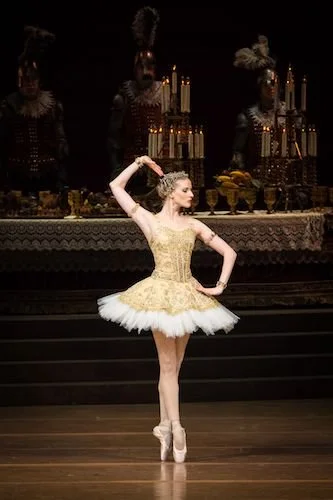Counterpoints (Kontrapunkte), Vienna State Ballet, Volksoper, September 15th, 2022
A short critique of a very short, but very rewarding Ballet evening with three, partially very short, pieces that were definitely much better presented on the smaller stage from the „Volksopera" than at the „State Opera".
An evening that consists of a peculiar composition of three pieces which, as the artificially created heading of the evening suggests, don't exactly create a contrast within them. Nevertheless, quite an interesting evening whatever the reasons are for its name, which I assume is more than a reference to Beethoven's „counterpoints-filled" composition for a String quartet.
Copyright: Vienna State Ballet / Ashley Taylor
„Große Fuge" (1992) by Belgian Choreograph Anne Teresa De Keersmaeker to Beethoven’s Große Fuge op.133 , whose work I was first introduced to during the „Impulstanz" Happenings here in Vienna, is a good example of how the body language and the dance vocabulary used for it can be partially loose, relaxed, using the same kind of malleable reaction as a „spring mattress" would cause. Even if extremely repetitious. If you look deeply into Twyla Tharp's (very) early work (And here I am talking about the late 60s) and the work that was later created by her (at that time) disciples, such as Graciela Figueroa (with whom I had the chance to work personally in my youth), you will see that this particular manoeuvre is nothing new. Yes, something that has already been seen before. Many times. And this is why I had all the time this feeling of „familiarity" with the piece and kept thinking of Happenings on Central Park – a surrounding that would be much more appropriate and fun to this creation.
Copyright: Vienna State Ballet / Ashley Taylor
Eno Peçi and Lourenço Ferreira master impeccably the (let me call it this way) „spring mattress effect", Claudine Schoch, not well cast, too stiff, and not free from a sort of rigid squareness on her upper body that has absolutely nothing to do with this contemporary work. Most notably Andrés Garcia Torres stands out from the group with a presentness and radiance that „gives away" much of his enjoyment in Dancing and being on stage.
Copyright: Vienna State Ballet / Ashley Taylor
Merce Cunningham's „Duets" (1979/80) is what I now consider a „Museum piece". To explain this I just need to refer to Fellini's „La dolce Vita" or (to the Ballet public in Vienna) van Manen's „Live": works that were very contemporary at the time of their creation but are „dated" now - something that was reconfirmed to me while watching, not long ago, those two works mentioned above. Some works are timeless, others not. And „Duets" belongs to the second category because of its music (even though fabulous John Cage’s Improvisation III), costumes, and a (very Cunningham) partially static approach to what is also considered the „Art of body movement" (or how I jokingly say, the Art of what happens between one pose and the next).
Copyright: Vienna State Ballet / Ashley Taylor
I enjoyed immensely seeing (and this is meant for the whole evening) many Dancers from the Corps in the spotlight – a good chance to evaluate more closely talents that are always more or less in the background. I congratulate Ballet director Mr. Schläpfer on this intelligent move. Just like this, my attention was brought to Sinthia Liz and her very imposing stage presence, Hanno Opperman, who developed a lot during the last years, lost somehow the „boyish aura" and is much more secure and „grown-up" on stage, strong and very pin-pointed Katharina Miffek, daring Daniel Vizcayo, musical François-Eloi Lavignac, very good Gloria Todeschini (even though her smiling face did not suit the general context and mood) and Kristián Pokorný, who is developing into a precise, fine dancer.
Copyright: Vienna State Ballet / Ashley Taylor
„Four Schumann Pieces" (1975) is one of Van Manen's works, that contrary to the above-mentioned „Live", is quite timeless. This time Martin Schläpfer's evening concept brought the climax of the evening to the very end of it. And that is very good.
Copyright: Vienna State Ballet / Ashley Taylor
The curtain goes up. In the spotlight (and Center Stage) Davide Dato, a dancer whom I have written of during the last 10 years while accompanying his fascinating development into a bright „Étoile" of the highest international level. Once more Mr. Dato has given us a technically precise performance accompanied by a beautiful sovereign reading of this part, which seemed nearly effortless, although it is far from it, with its technical challenges, particularities and „inner tempo" ups and downs. It may sound inexplicable to some but I can honestly tell you that there are easier things than to make all of a sudden a slow grand-plié in the 5th position facing the audience just immediately after one has been jumping, doing pirouettes and tours-en-l'air!
Copyright: Vienna State Ballet / Ashley Taylor
Hyo-Jung Kang in full control of the part and Liudmila Konovalova looking a bit haggard and emotionless but very exact in her execution, gave good, correct performances. On the other hand, the three „second-row dancers"; Igor Milos, Andrey Teterin, and Géraud Wielick, due to their more magnetic, strong stage presence and execution skills, stole the attention of the „first-row" Arne Vandervelde, who looked genuinely bored and weak and from Alexey Popov whose facial expressions and general „entrée en scène" seemed more like a schoolboy's than a Soloist's.
Copyright: Vienna State Ballet / Ashley Taylor
Altogether a cozy and very recommendable evening with an audience filled with many dancers of the company and, apparently, many „friends of friends" who were shouting and screaming „Bravo" - Why do people nowadays have to scream „Bravo" for simply everything and cannot be picky anymore and „give Caesar what belongs to Caesar"? - while the customary Volksopera public was much more reserved. Nevertheless a very interesting evening!













